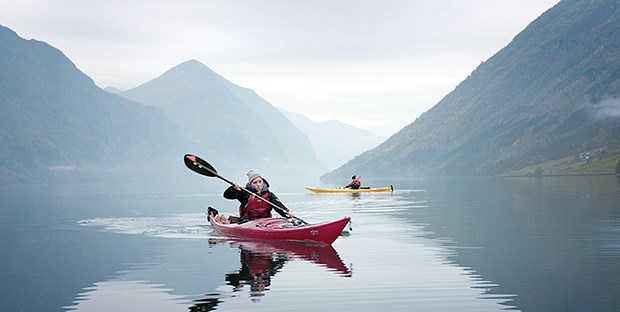Hevn. Directed by Kjersti Steinsbø. Opening Friday, June at Cineplex Odeon International Village Cinemas.
One look at the idyllic fjord-side location and a glance at the film’s title from an English-language-centric perspective and you might assume that Kjersti Steinsbø’s first feature – Hevn – is a pretty drama about those impossibly chic Norwegians.
Look closer: Hevn means “revenge” in Norwegian; the vertical forests at the water’s edge are more claustrophobic than scenic, and the icy fjords are, ominously, more than a kilometre deep.
It’s into this setting that a woman arrives unannounced, claiming to be a travel writer on a spontaneous assignment. She has no notebook, tape recorder or luggage, just a butcher knife in her handbag. Rebekka (Siren Jorgensen) is here to avenge the rape of her younger sister years before, and to make hotelier Morten (Frode Winther) pay.
The contrast of horrific subject matter with glorious scenery was a purposeful decision on Steinsbø’s part, though things didn’t go according to plan: the weather, meant to be dark and oppressive, was uncharacteristically sunny. “At first we felt like we were shooting a dairy commercial,” she laughs. “My DOP (Anna Myking) jokingly said ‘even my mom could make this feel beautiful!’”
The end result is perfect, a bright and optimistic start that turns darker as Rebekka’s motives and true identity are slowly revealed.
Steinsbø similarly had to go to a dark place when she was writing the script, based on Ingvar Ambjornsen’s novel The Doll in the Ceiling. “I have so much respect for the novelist, it took me some time to write him off, for lack of a better word, and make it my own.” She wrote in “a small cottage by the sea” by herself. “I’m not a sad or dark person, I had to go down to the basement to dig out the black sides of myself.”
Producer Kristine Knudsen fell in love with the book and sent it to Steinsbø, who initially said no to the project. She imagined that her first feature would be on the lighter side, a bittersweet comedy, “something closer to home.” But she says she couldn’t let go of the main character: “I love the ambivalence… she’s a heroine and protagonist, but you sometimes feel she goes too far.”
Rebekka’s violent intentions change when she’s introduced to Morten’s wife Nina (Maria Bock) and baby Astrid. Nina offers Rebekka both a glass of wine and the clothes off her back… literally. The two generate a fast – if one-sided – friendship. “I wanted to play around with sisterhood,” says Steinsbø. After Rebekka’s younger sister dies she doesn’t expect to have another relationship with a woman.
The closeness makes Rebekka more manipulative and mean, she says, even as she thinks she’s saving Nina. “But she doesn’t do it on Nina’s terms.”
Europeans and Westerners like to think of themselves as more progressive than people from countries with a more public and pervasive rape culture. Yet, the female characters in Hevn illustrate why women are still reluctant to report abuse: teenaged Sara’s (Kine Bortheim Jentoft) father shrugs off his daughter’s intuition about Morten; town “troublemaker” Maya (Helene N. Bergsholm) turns to booze and drugs because no one will believe her. “I think in Norway we tend to think of ourselves as a great, well-functioning society,” says Steinsbø, who points to the country’s drug problems and “elderly people rotting away in homes” as counters to that statement. “There are so many rapes that are not even reported because girls don’t have the courage to … and very often the punishment doesn’t fit the crime or the abuser is not punished at all … it’s a huge problem.”
The director didn’t have to go far when researching the film to gather stories from rape survivors and their families: “Unfortunately I think we all know people who have experienced these things.”
The cinematographer, producer, production designer, casting director and many other crew members on the Norway-Canada co-production are women, some of whom Steinsbø has worked with previously; the estrogen-heavy set was not a deliberate decision. “(The crew) happen to be talented and they happen to have a vagina,” she laughs, admitting that at some point she had to bring more men into the mix to even things out.
The male characters in the film, including Morten, bartender Bimbo (Anders Baasmo Christiansen) and town doctor (Trond Espen Seim) have their moments, but it’s Jorgensen who shoulders the intensity and overwhelming grief running through the story. The actor conveys much in close shots, often with minimal dialogue. “Siren has a very interesting face. She can be so ugly, so pretty, so masculine, so feminine,” says Steinsbo. “She can switch from soft to hard and warm and cold in an instant.”
So is Rebekka’s plan for revenge a sign of strength or a crippling weakness? “I think she pretends to be strong but I don’t think this revenge makes her into a better person,” Steinsbø says. “I hope she’s happy somewhere but I’m a bit worried for her .… I like to think that she’s OK.”



